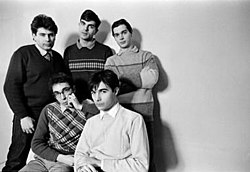Idoli
| Idoli | |
|---|---|

Idoli
Photo: Goranka Matić |
|
| Background information | |
| Also known as | VIS Idoli |
| Origin | Belgrade, SR Serbia, SFR Yugoslavia |
| Genres | New wave, art punk, post-punk, experimental, pop rock |
| Years active | 1980–1984 |
| Labels | Izgled, Jugoton, Croatia Records, City Records, PGP RTS |
| Associated acts | Apartchiks, Dobrovoljno Pevačko Društvo, Die Tonzentrale, Propaganda, Zona B |
| Past members |
Vlada Divljan Nebojša Krstić Srđan Šaper Boža Jovanović Kokan Popović Zdenko Kolar Branko Isaković Goran Vejvoda |
Idoli (Serbian Cyrillic: Идоли; trans. The Idols) were a Yugoslav new wave band from Belgrade. They are considered to be one of the most notable acts of the Yugoslav rock scene, and their 1982 album Odbrana i poslednji dani was on several occasions voted by the music critics as the greatest Yugoslav rock album.
The roots of Idoli can be found in a band called Merlin (not to be confused with the Sarajevo pop rock band of the same name) and then Zvuk Ulice consisting of Vlada Divljan on guitar and vocals, bassist Zdenko Kolar, keyboard player Dragan Mitrić, drummer Kokan Popović, Bora Antić on saxophone and Dragana Milković on piano and vocals. The band played a combination of jazz and pop rock. Besides performing cover versions of notable foreign bands from the sixties, the band wrote their own songs. In 1978, the band performed at the Novi Sad BOOM Festival and at the Zaječar Gitarijada feastival. Even though the band had several recording sessions in Radio Belgrade, none of the material was released. Mitrić went to Bulevar and Popović went to Slađana Milošević's band.
The first ideas of forming Idoli came up in 1979 when a youth magazine published photos of a band called Dečaci which were actually photos of the first Idoli lineup. The photos featured witty remarks like, for example on March 8, 1979, a photo signed "Dečaci emancipuju žene" ("The Boys emancipate women"). At the same time Belgrade walls were ornamented with graffiti announcing the formation of the band. "Margita je dečak" ("Margita is a boy", the first ever graffiti in Belgrade dedicated to Margita Stefanović who later became Katarina II keyboardist.), "Dečaci ne plaču" ("Boys Don't Cry") or "Srđane budi čovek" ("Srđan, be a man") are only a few examples. Having created a media campaign and gained the public's attention, the band had to prove their existence and start playing.
...
Wikipedia
